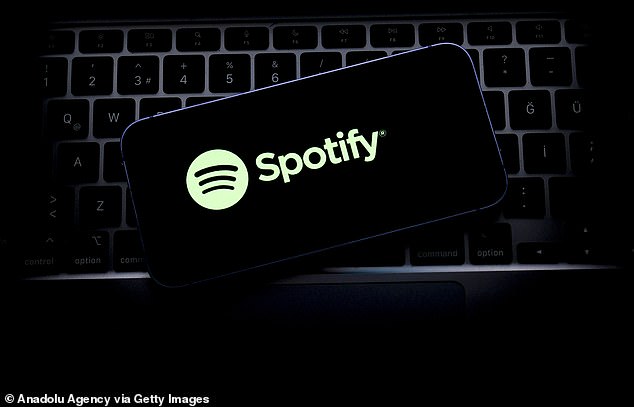
A shake-up of Spotify’s royalty model has sparked concerns that smaller artists could be left even worse off under the streaming giant’s new compensation strategy.
Spotify revealed major changes to its royalty model this week designed to ensure the more than $40billion (£32billion) its dolls out each year ‘is going to the people our platform is designed to enable: emerging and professional artists’.
It told its artists that ‘drains’ on its royalty pool ‘have now reached a tipping point’, revealing new policies to ‘deter artificial streaming…better distribute small payments that aren’t reaching artists…and rein in those attempting to game the system with noise’.
Doing so, it says, will drive around $1billion in revenue toward ’emerging and professional artists over the next five years’.

The Stockholm-based company will make it tougher for artist to make money from the platform and will instead distribute more money to major labels and artists
How is Spotify tackling the ‘drains’ on its royalty pool?
Music artists make the bulk of income outside of live performances via streaming platforms. Essentially, the more times fans stream their work, the more money they will earn.
From early next year, a Spotify track must have reached at least 1,000 streams in the previous 12 months in order to generate recorded royalties.
The group will also charge labels and distributors per track when Spotify finds examples of ‘flagrant’ artificial streaming, while it is increasing the minimum track length of ‘functional noise recordings’ to two minutes.
General secretary of the Musicians’ Union, which represents the interests of 33,000 UK musicians, Naomi Pohl told This is Money: ‘Platforms changing their model following negotiation with major labels is concerning.
‘While the model purports to be “artist centric” it will in fact divert money from emerging artists towards major artists and of course the labels themselves.’
Pohl also expressed her frustration at the changes being made without any negotiation with artists or artists’ representative bodies.
She added: ‘We have been promised a Government-convened working group on creator remuneration from music streaming so this is the sort of proposal that could and should have been proposed there, rather than implemented unilaterally.’
But not everyone agrees that the new royalty model hurts smaller artists…
President of distribution platform Stem, Kristin Graziani disagrees that the new minimum streaming threshold will leave early career artists at a disadvantage.
In a guest essay for New York-based magazine Consequence, she argued that because 1000 streams a year equates to just $3 in earnings, the impact is minimal.
She added: ‘$3.00 is well below the threshold at which almost every distributor allows artists to transfer earnings into their own bank accounts. In other words, this is money that isn’t currently making it to artists in the first place.
‘Right now, artists don’t benefit from the millions of tiny payments that Spotify pays for content that receives a few streams per month. It’s the distributors who benefit from the hundreds of thousands of dollars sitting in their bank accounts earning interest.’
How does Spotify make its money?
Spotify, which is the word’s most popular audio streaming subscription service, primarily makes its money through its Premium Services as well as Ad-Supported Services.
Its monthly active user base was up by 26 per cent to 574million listeners in the third quarter, which it said last month was 2 million ahead of its guidance.
Spotify also posted profits of over £28million, the first quarterly profit the company has managed since 2021.
Subscribers grew by 16 per cent year-to-year to 226 million, with total revenue up 11 per cent to around £3billion which also exceeded guidance.
This is despite it raising its prices for the first time in the UK earlier this year.
The company said it would charge £10.99 a month for its premium service, up from £9.99. This followed similar moves by rivals such as Apple Music.
Ben Laidler, global markets strategist at eToro, told This Is Money: ‘Spotify and streaming have near single handedly driven the renaissance of the global recorded music industry after its near-death experience a decade ago.
‘It’s become an affordable essential service for music-loving Generation Z, who have led the strong 16% per cent recent growth in its paid premium service. This accounts for near 90 per cent of its sales, and comes despite the economic slowdown and cost-of-living headwinds and broader subscription service fatigue.
‘Their podcast expansion has been a costly detour but the growth outlook remains strong, with overall listeners growing 26 per cent, only 40 per cent subscribed to the premium service, and half the user base still in just the US and UK.’
How much do Spotify and rivals Apple and Amazon Music pay artists?
Like Spotify, rivals Apple Music and Amazon Music rely heavily on subscriptions to generate profits.
While Spotify is clear its model does not compensate artists on a per-stream basis, it’s compensation model is understood to work out at $0.003 to $0.005 per play.
This is significantly less than the $0.01 per stream that Apple Music revealed it pays artists in 2020.
However, this value is also an average, with the amount depending on the subscription plan and country or region.
Amazon Music also reportedly pays more than Spotify. The internet retail giant is rumored to pay artists between $0.004 and $0.007 per stream.
DIY INVESTING PLATFORMS
Affiliate links: If you take out a product This is Money may earn a commission. These deals are chosen by our editorial team, as we think they are worth highlighting. This does not affect our editorial independence.









